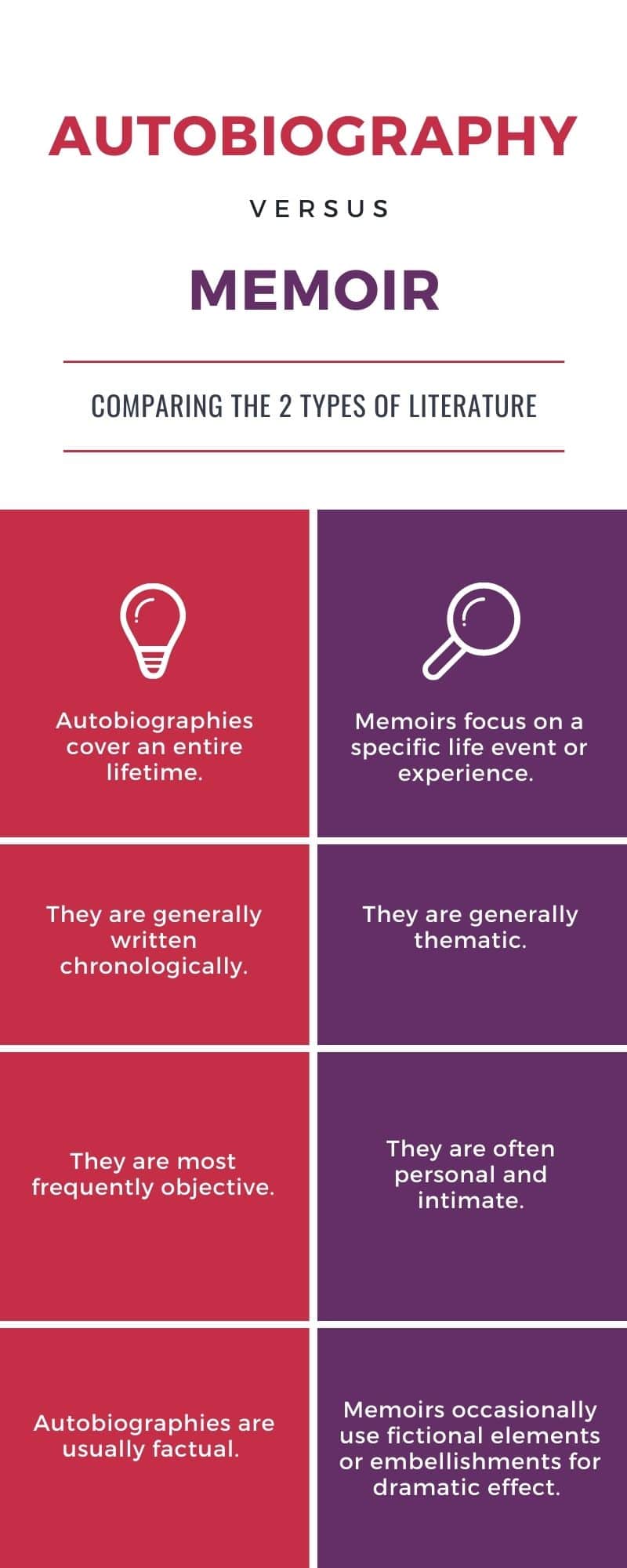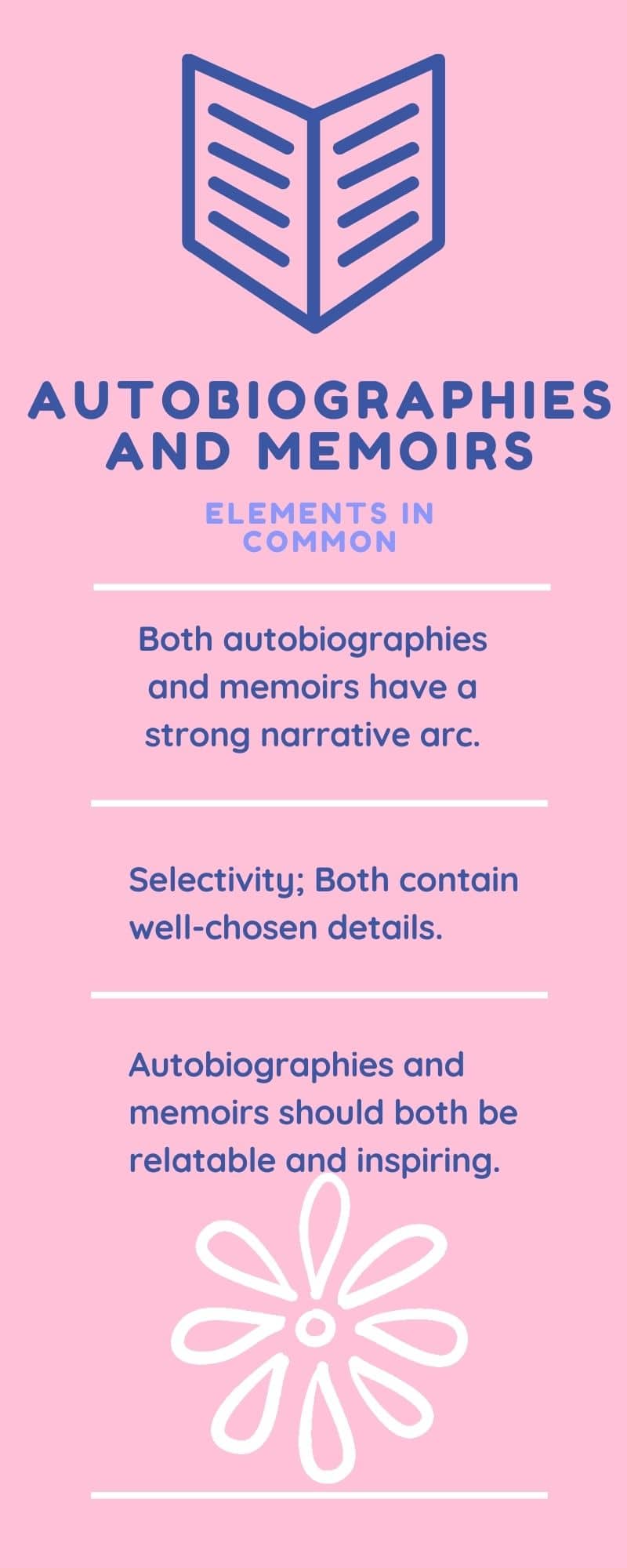Autobiography or Memoir? Choosing the Right Format for Writing Your Life Story
March 12, 2021
Do you have a story to tell about your life? Have you been considering writing an autobiography? Or is it a memoir you really want to write?
What’s the difference? And how do you decide which is right for your story?
While the terms “autobiography” and “memoir” are often used interchangeably, there are some important distinctions. And understanding those distinctions will help you decide which format best fits your needs.
What’s the Difference Between Autobiography and Memoir?
Autobiography
The word autobiography is derived from three Greek words meaning “self,” “life,” and “writing.” As defined by the Oxford English Dictionary, an autobiography is “an account of a person’s life written by that person.”
An autobiography, by definition, usually covers an entire lifetime. It’s typically a chronological, linear account. Although, some autobiographies move back and forth in time in order to dramatize events.
Autobiographies tend to be formal, factual, objective life stories, with an emphasis on key events that shaped the writer.
According to Elizabeth Jarrett Andrew, a Minneapolis-based writing teacher and author of Writing the Sacred Journey: The Art and Practice of Spiritual Memoir, a key distinction between autobiography and memoir is the writer’s intent.
“Autobiography serves a different purpose than memoir does,” she says. “Autobiography is a personal narrative of a life that’s a complete record of that life. And because of that, it honors all dimensions of that life.”
Memoir
A memoir, by contrast, is a more intimate, personal narrative focused on a specific meaningful aspect of the writer’s life.
The word memoir is derived from the French word memoire, meaning memory or reminiscence.
Masterclass.com defines memoir as a “first person written account of events and memories from the author’s real life. Memoirs…focus on personal experience, intimacy, and emotional truth.”
A memoir is generally organized thematically rather than chronologically, giving readers a glimpse into a defining life event or experience.
In a memoir, the writer tells his or her story through a particular lens, such as grief, illness, or addiction.
It might also be about a place, like Kathleen Norris’s Dakota, or a person, like Vivian Gornick’s Fierce Attachments, about her relationship with her mother.
Memoirs are more often motivated by curiosity, exploration, and the desire to gain perspective on life events.
“Memoir is more composed, more crafted,” says Andrew. “It has art as part of its intent. A strong attribute of memoir is the author’s willingness to reflect on and make meaning of the past.” This quality of reflectiveness is a primary distinction of a memoir.
A good memoir is characterized by a compelling theme, like the search for identity in Barack Obama’s Dreams from my Father, and a strong character arc–the writer’s emotional journey or inner transformation over the course of the story.
It also tends to incorporate elements of fiction—dramatic tension, character development, dialogue—to create vivid storytelling and a more visceral experience for the reader.
Finally, a well-written memoir goes beyond the writer’s individual story to illuminate universal human truths.
For example, Frank McCourt’s Angela’s Ashes, about his impoverished Irish upbringing, is ultimately a story of transcendence and forgiveness.
In summary, think of an autobiography as the story of your life, and a memoir as a story about a specific, defining aspect of your life—a particular experience, relationship, place, or quest.

What Do They Have in Common?
Regardless of whether you choose to write autobiography or memoir, compelling personal narrative shares some key characteristics.
Both autobiographies and memoirs have a clear story arc–a well-organized structure and progression, regardless of whether they’re chronologically told. And they’re selective, using well-chosen details.
An effective personal narrative is also relatable in some way. Although we may not have had the writer’s specific experiences, the story has emotional resonance. We can recognize the human challenges the writer has faced. What lessons can we take from the story for our own lives?
The best autobiographies and memoirs share another important quality: inspiration.
Though our lives may be nothing like the writer’s, we come away feeling inspired by their story, their challenges, and their triumphs.
Maya Angelou’s I Know Why the Caged Bird Sings, about her lifelong struggles with racism and her quest for identity and dignity, is a soaring example of an inspirational autobiography.

Which is Right for You—Autobiography or Memoir?
In thinking about your story, consider the following questions.
Why are you telling your story? If you want to capture the fullness of your life as a legacy for family and friends, it may be best served by autobiography. If you’re focused on exploring and understanding a specific life experience, memoir may be more appropriate.
Think about your motivation and what will keep you inspired as you move through the often lengthy and complex writing process.
Who are you writing for? What do you want readers to take away from your story?
Andrew suggests that one way to determine which form suits your story best is to consider your writing process. When you begin to write, what memories emerge organically?
“I often suggest to writers that they create a timeline of the important events they’re inspired to write about, or just brainstorm those events and put them out on a page, and then write them in whatever order they want,” she says.
“When you’re motivated more by curiosity than by feeling bound to a particular form or chronology, you can allow the story to take its own shape. Trust your own instincts.”
Ready to Write? How to Get Started
Whether you’re writing your autobiography or your memoir, there are a wealth of resources available.
Elizabeth Andrew’s website offers a comprehensive list of exemplary titles and other writing resources. Here are some additional options to get you started:
- A simple internet word search like “how to write an autobiography or memoir” turns up a vast compendium of online articles.
- Countless books provide instruction on writing memoir and autobiography. Again, a Google or Amazon search will deliver access to a range of writing guides.
- Writing courses in autobiography and memoir are available through many organizations including Masterclass, Skillshare, and Udemy.
- Writing coaches and teachers offer personal instruction and guidance in memoir and autobiography writing.
You may also want to consider hiring a ghostwriter. There are many good ghostwriting and book development services that can provide expert help with the process.
Telling your story, whether as autobiography or memoir, is a significant and worthwhile undertaking. By giving careful thought to the elements of your story and your purpose in writing it, you’ll be well-prepared for the journey.






























